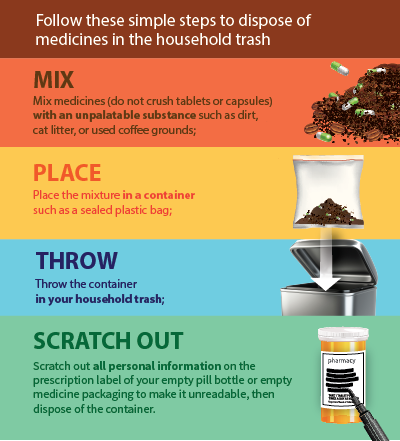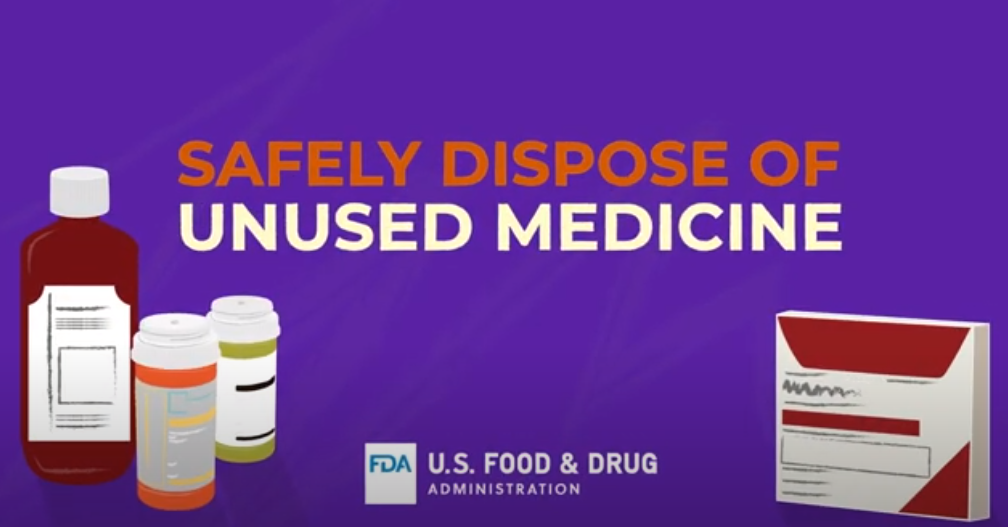
Old, expired antibiotics are being exposed of improperly. You and others go to the doctor for a cold or infection and are prescribed by a doctor to take a certain antibiotic to help fight and kick out the cold/infection from your body. A LOT of the time, people do not finish their prescriptions so there can be some pills left in the bottle. Due to the improper disposal of antibiotics, some issues can arise. We can see accidental children/teen poisonings, contaminated water, such as rivers, lakes and streams, and finally can cause harm the aquatic life which we could later digest.
https://www.buzzrx.com/prescription-medication-disposal

9 time out of 10 left over antibiotics are stored in the back of the medicine cabinet, forgotten about until someone decides it's time to clean out the cabinet.
HOW, you may ask, are they exposed of improperly?
In some cases when antibiotics are left in the medicine cabinets, unattended children or teenagers may get a hold of them by accident.
Many people may not know the damage that takes place when antibiotics are not disposed of properly.
Storing old antibiotics:
Some people like to store their unused antibiotics in the medicine cabinet thinking if they get another infection they'll have some left over medication to help. However, that can be dangerous. How? Well a curious child or teen may go through the cabinets, see the left over medication and take the antibiotic without thinking of the consequences.
Throwing them down sinks or toilets:
Other people may throw their unused/unwanted antibiotics down the sink or toilet. This can cause damages in a couple of ways. "Recent studies have found that medications flushed down the drain can contaminate our lakes and streams, which can hurt fish and other aquatic wildlife and end up in our drinking water" (Minnesota Pollution, 2013). Anything thrown down our drains will end up in our water waste treatment systems which can lead to near by rivers, lakes or streams. Our water waste treatment systems are not designed to clean up and breakdown medications. According to the W.H.O, if we constantly drink contaminated water from improper antibiotic disposals, we may become resistant to a specific antibiotic; that is the bacteria in our bodies will become resistant.
https://www.cleanwaterteam.com/public-outreach/pain-in-the-drain/medicine-disposal
How can you dispose of antibiotics properly? Well, there are many ways of doing so. One of the most common ways to dispose of them is through a Drug Take-Back location. Many local pharmacies or even police stations will take your unwanted and unused antibiotics in order to help stop improper disposal and the harm it can do for our environment. Just a simple search on Google with your zip code will tell you what pharmacies or other locations are taking back antibiotics during that time.
The FDA also states that for those who do not have drug take-back days you can dispose of the antibiotics at home by mixing them with an unappealing substance such as:
After mixing them with the unappealing substance, place the mixture in a sealed plastic bag before throwing it away (FDA, 2020). You will also want to scratch out any personal information by going over your name and date of birth with a sharpie or pen when throwing away the prescription bottle.
https://www.uppermichiganssource.com/2021/11/01/dea-national-prescription-drug-take-back-day-brings-nearly-745k-pounds-unneeded-medications/
https://www.fda.gov/drugs/disposal-unused-medicines-what-you-should-know/drug-disposal-dispose-non-flush-list-medicine-trash

Now that you know more about the proper ways to dispose of antibiotics, tell your family, friends and neighbors! Let them know about the dangers improper disposal can cause on not just themselves or a loved one, but also to the environment as well. Share the information about the DEA drug take-backs as well! That is a very useful and great way to get rid of the unwanted/unused antibiotics in your house hold. Feel free to click on the informational video as well to share with others!
To get involved, please consider taking this short survey about how you would dump your unused antibiotics.
https://www.surveymonkey.com/r/QBKF3F2

https://www.fda.gov/drugs/safe-disposal-medicines/disposal-unused-medicines-what-you-should-know
Center for Drug Evaluation and Research. (n.d.). Disposal of unused medicines: What you should know. U.S. Food and Drug Administration. Retrieved March 27, 2022, from https://www.fda.gov/drugs/safe-disposal-medicines/disposal-unused-medicines-what-you-should-know
Center for Drug Evaluation and Research. (n.d.). Drug disposal: Dispose "non-flush list" medicine in Trash. U.S. Food and Drug Administration. Retrieved March 27, 2022, from https://www.fda.gov/drugs/disposal-unused-medicines-what-you-should-know/drug-disposal-dispose-non-flush-list-medicine-trash
Center for Drug Evaluation and Research. (n.d.). How to safely dispose of unused or expired med - full video transcript. U.S. Food and Drug Administration. Retrieved March 27, 2022, from https://www.fda.gov/drugs/ensuring-safe-use-medicine/how-safely-dispose-unused-or-expired-medicine-video-transcript
Clark County Water Reclamation District, NV. Medicine Disposal | Clark County Water Reclamation District, NV. (n.d.). Retrieved March 27, 2022, from https://www.cleanwaterteam.com/public-outreach/pain-in-the-drain/medicine-disposal
Don't flush medicines down the drain. Minnesota Pollution Control Agency. (2017, March 8). Retrieved March 27, 2022, from https://www.pca.state.mn.us/featured/dont-flush-medicines-down-drain
Prescription Medication Disposal . Prescription medication disposal. (n.d.). Retrieved March 27, 2022, from https://www.buzzrx.com/prescription-medication-disposal
Team, T. V. N. (n.d.). DEA: National Prescription Drug Take Back Day brings in nearly 745k pounds of unneeded medications. https://www.uppermichiganssource.com. Retrieved March 27, 2022, from https://www.uppermichiganssource.com/2021/11/01/dea-national-prescription-drug-take-back-day-brings-nearly-745k-pounds-unneeded-medications/
